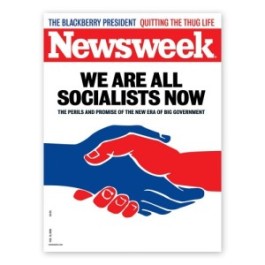Of all of the naive secular utopian schemes for organizing society — and there have been plenty of them over the millennia — the only one that seems to have gained any traction in the American culture is socialism, in all of its multifarious shapes.

There have been more forms of socialism than breeds of dogs, which, although they all superficially resemble one another, don’t have the same bark. Ask any three socialists for a detailed description of what they want, and you will almost certainly get three different accounts. And isn’t that where the devil dwells, in the details?
In a disturbing echo of today’s culture, a hundred years ago the United States was having its first fling with socialism. Dewy-eyed socialists were getting an encouraging come-on from big-government Progressives that after a brief courtship there would inevitably come the consummation.
Also echoing circumstances of today, enthusiastic socialists took to the media to spread their gospel. In those days, there were only two sources for news: word of mouth (including speechifying) and print. Dozens of articles by some of the leading intellectuals of the time advocating, in essence, “Socialism Now!” still survive.
It seemed, therefore, that a socialist revolution of some sort was inevitable, the principal question being, would it be a peaceful revolution (per the Fabians) or a violent transition (advocated by the Marxists)?
A 1911 Atlantic article summarized what was on many minds:
INDIFFERENCE to the modern socialistic movement is fast becoming an impossible attitude of mind. Friendliness or hostility to it, in some degree, must come into the feeling of everybody who gives the slightest heed to the auguries of our time; for the movement has now gathered a momentum that will carry it surely to some vital and momentous outcome of change in the economic organization of society. If this is not to be calamitous, but is to realize in any measure the good equalities and satisfactions which Socialists expect, that happy result can arrive only in communities which have forethoughtfully safeguarded themselves, with all the wisdom they possess, against ruinous recklessness or perfidy in the working-out of so critical a change. It is nowhere too soon to take serious thought of what we need to be doing in preparation.
Our author next outlined six “forces of opinion which act on the propositions of Socialism from different dispositions of mind,” noting that
. . . while the people who have a personal stake in the capitalistic system form a numerous body, it does not compare in numbers with the opposing host [i.e., that vast number of “workers of the world” the socialists claimed to represent and hoped to unite]. It exercises powers, at present, which are far beyond measurement by its numbers, but they are powers created by the economic conditions of to-day, and dependent on states of feeling which have no fortitude or staying quality in them, but which can be broken into cowardly panic by the most trifling alarm. For resistance to an undertaking of social revolution, nothing weaker than a capitalistic party could be made up. Its strength in the pending contest with Socialism is practically the strength of the alliances it can form.
The writer could see no possible conjoining of the revolutionary forces with the “conservative” capitalists without some kind of reformation of the status quo political parties, thus anticipating something like that “Third Way” we used to hear so much about:
. . . It comes, then, to this: if possibilities of good to society are in the socialistic scheme, they are obviously and absolutely dependent on the discretion, the honesty, the social sincerity and good faith, with which it is carried into effect. A reckless and knavish corruption of the undertaking so to revolutionize the social economy could produce nothing else than the worst wreckage that civilized society has known. Hence the question between possibly beneficent and inevitably calamitous results from the undertaking is a question of character in the government to which it is trusted. The present character of government in our country, throughout its divisions, controlled as it is by self-seeking professional managers of political parties, is not to be thought of as one which could work the socialistic experiment to any other than the destructive result. The conditions that give this character to our political parties, and through them to the government which they control alternately, will surely give the same character to a socialistic party, if it grows up under their action, and approaches an attainment of power while they prevail.
But it is so growing, and seems more than likely to arrive at power to control some, at least, of our divisions of government at no far distant day. Therefore, the most urgent of all reasons for a resolute, radical, and immediate reformation of parties and the politics they embody is found in the progress of socialistic belief.
In this article, then, we see an anticipation of what it has taken more than a century to play out: a Third Way socialist takeover of the power centers of American politics. For our author, socialism was ineluctable, with only the when and how in doubt.

